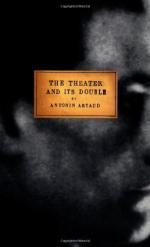
|
| Name: _________________________ | Period: ___________________ |
This test consists of 5 multiple choice questions, 5 short answer questions, and 10 short essay questions.
Multiple Choice Questions
1. Writing of Balinese performances, Artaud notes that "Everything is thus regulated and impersonal; not a movement of the muscles, not the rolling of an eye but seem to belong to a kind of reflective ________ which controls everything and by means of which everything happens."
(a) Mathematics.
(b) Mechanization.
(c) Science.
(d) Artistry.
2. Of the performers of the Balinese theater, Artaud writes, "They are like huge _____ full of lines and segments drawn to connect them with an unknown natural perspective of which they seem nothing more than a, kind of detached geometry."
(a) Insects.
(b) Gods.
(c) Men.
(d) Monsters.
3. What word expressed by the translator is typically translated as "mind" because it has no English equivalent, combining as it does both mind and spirit?
(a) L'amour.
(b) Rioutet.
(c) Jouissis.
(d) Esprit.
4. Where does Artaud say "there is no art: things are made for use."
(a) Africa.
(b) Asia.
(c) Mexico.
(d) America.
5. Artaud writes, "We are told that the Mysteries of ______ confined themselves to the mise en scene of a certain number of moral truths."
(a) Odysseus.
(b) Sappho.
(c) Orpheus.
(d) Eleusis.
Short Answer Questions
1. Artaud says that the actors of the Balinese theater appear to be as animated what?
2. In "Oriental and Occidental Theater," the author writes, "if we restrict theater to what happens between cues, we have still not managed to separate it from the idea of a ________."
3. What is proposed by the author as meant to shake up the foundations of civilization and culture as a whole?
4. Artaud suggests that "true theater" should not mirror human life but instead should evoke what?
5. Artaud believes that in its current, Occidental interpretation, theater is limited to mimicking what through scripted dialogues?
Short Essay Questions
1. What does "gold" represent in Artaud's analogy of "The Alchemical Theater"?
2. What commonality does Artaud assert between Alchemy and the theater?
3. What is the principle limitation of the current theater, as described by the author in "Metaphysics and the Mise en Scene"?
4. Who does Artaud hold responsible for much of the "masterpieces" he wants to demolish? Why?
5. What are the author's feelings about psychology and the theater? What of poetry?
6. What reality should the theater reflect, according to the author in "The Alchemical Theater"?
7. In what reference does Artaud comment on Plato in "The Alchemical Theater"?
8. How does Artaud draw the comparison between the theater and a plague?
9. What is the meaning behind the title of "The Theater and Its Double"?
10. What does the author claim is the reasoning behind why the public is turning away from the "higher" arts in "No More Masterpieces"?
|
This section contains 1,036 words (approx. 4 pages at 300 words per page) |

|




